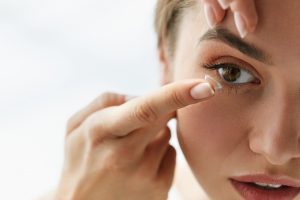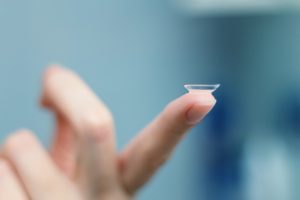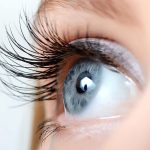After a long day, removing and cleaning your contact lenses before bed can feel like a chore. But Mass. Eye and Ear Optometrist Amy Watts, OD, explains why it’s something you should never skip.
Sleeping in contact lenses increases your risk of infection
Most people have fallen asleep in their contact lenses at least once. But it’s more dangerous than you might think.
“Normally, the eyelid works like a windshield wiper, keeping the surface of the eye clean and lubricated with tears,” says Dr. Watts. But when you wear contact lenses, microbes can become trapped between the cornea (the clear front surface of the eye) and the contact lens.
This is especially true if you fall asleep while wearing the lenses. In fact, sleeping in your contact lenses increases the risk of eye infection by 10-20 times. “That’s because closing your eyes during sleep creates the perfect environment for an infection to spread. Bacteria and fungi thrive in the warm, moist and dark space that is created when your lids close,” Dr. Watts explains.
It is important to remove and properly clean your contact lenses each night to help kill any microbes before they multiply and cause an eye infection. Dr. Watts also recommends giving your eyes a rest after a full day with contacts. “It’s best to limit wear to about 10 hours a day to reduce the risk of infection and dry eye.”

Signs of infection
The most common signs of an infection are one or both eyes becoming red, uncomfortable or sensitive to light. If you think you have in infection, remove your contact lenses and visit your eye doctor as soon as possible. An optometrists or ophthalmologist will be able to determine if the infection is bacterial, viral, or fungal, and prescribe the best treatment. You should also be prepared to throw out your current contact lenses and the storage case to prevent re-infection.
Sleeping in extended-wear contact lenses
There are a handful of contact lenses that are approved for extended wear over night, but Dr. Watts rarely prescribes them. “In a healthy patient who is capable of inserting and removing their own lenses, I believe the risks of overnight wear always outweigh the benefits.”

Other ways to prevent eye infections
Bedtime isn’t the only time you should remove your contacts. Dr. Watts also advises patients to remove their lenses when there is a chance of water getting into the eye. “You should always take out your lenses before showering or swimming. Tap water or water from a pool, ocean or pond also contains microbes that could cause an infection.”
And always make sure to wash your hands with a mild soap and dry completely before inserting or removing contact lenses.
Learn more about safely removing and inserting soft contact lenses.
About our expert

Dr. Amy Watts is full-time optometrist and director of the Optometry and Contact Lens Service and the Vision Rehabilitation Service at Mass. Eye and Ear. She provides routine contact lens fittings and specialized contact lens fittings for patients with corneal diseases, post penetrating keratoplasty, post keratoprosthesis, post-refractive surgery, and aphakia. She sees patients at the main Mass. Eye and Ear Campus (243 Charles Street, Boston).

